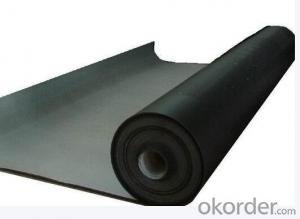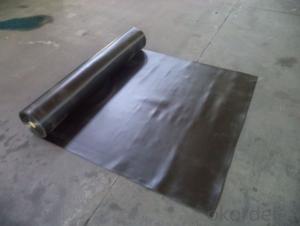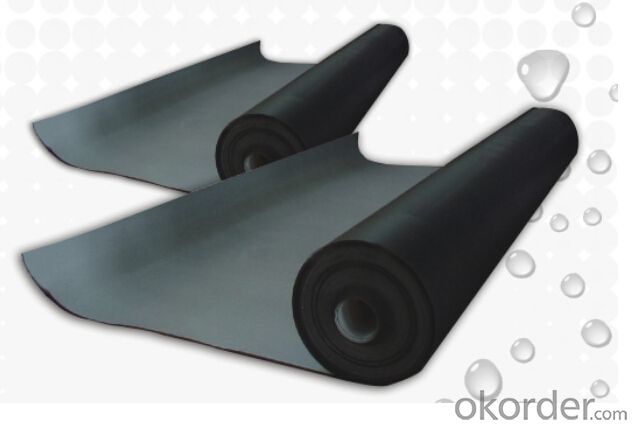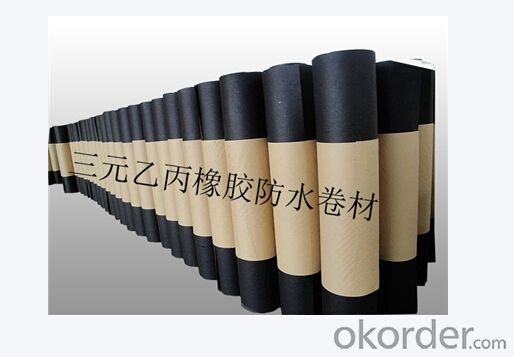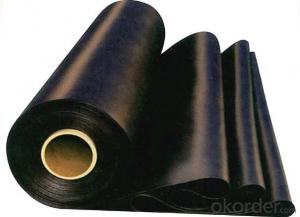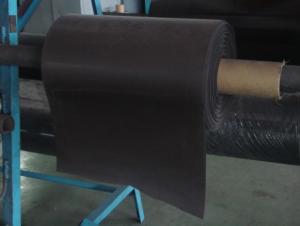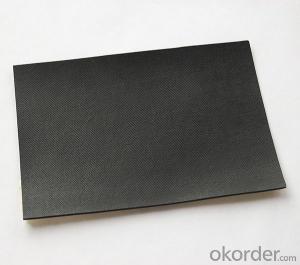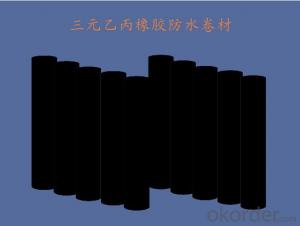EPDM Rubber Waterproofing Roof Membrane Weldable
- Loading Port:
- Qingdao
- Payment Terms:
- TT OR LC
- Min Order Qty:
- 2000 m²
- Supply Capability:
- 100000 m²/month
OKorder Service Pledge
OKorder Financial Service
You Might Also Like
EPDM waterproofing roofing membrane
1. Introduction:
This waterproof coiled material is of high elasticity with best performance among high polymer waterproof coiled material in the world.It is also the most typical one in the world.Waterproof coiled material made of ternary ethylene-propylene rubber is produced the use of the most advanced continuous extrusion and vulcanization technology and related equipments which is specially designed for production of such product.
It is good in compactness,without bubble and performance difference in length and breadth,performances reach or exceed the demands of GB18173.1-2012 standard.
2. Features:
1>Excellent anti-aging performance, service life up to 50 years
2>Working well with in -40°C to 100°C,it can be constructed with a single layer in ambient temperature. 3>Waterproofing on various kinds of underground project,industrial of civil buildings and structures. 4>high extension rate, high tensile strength, small size changes at heat treatment
5>Good plant roots penetrability resistance and can be made waterproofing layer of planting roof
6>Special modified molecular structure ,effectively resolving the current domestic and foreign glue joint problem . 7>Good low temperature flexibility, and good performance of adapting to ambient temperature changes. 8>Convenient application ,solid joint, no environment pollution
9>chemical corrosion Resistance, can be used for special occasions
3. Specification:
Type | EPDM Waterproof Membrane | |||
Material | EPDM Rubber | |||
Thickness | 1.0mm | 1.2mm | 1.5mm | 2.0mm |
Size | 1.2m(width) * 20m(length)/roll | |||
Type | Vulcanized | |||
Pattern | Non-reinforced(homogeneous) | |||
Packing | 24sqm--80sqm/roll, with plastic bag | |||
Color | Black | |||
Application | Roofs, basement, pond, Lake, steel structure roof, swimming pool, underground, tunnel, etc | |||
4. Technical Data:
ITEM | STANDARO REQUEST | |
Tensile strength at breaking,normal temperature,Mpa | ≥7.5 | |
Elongation at breaking, % | ≥450 | |
Tearing strength,KN/m | ≥25 | |
Bending at low temperature | ≤-40°C | |
Water impermeability,0.1Mpa×30min | Impermeability | |
Hot air aging 80°C×168h | Unchanging of tensile strength at breaking,% | ≥80 |
Unchanging of elongation at breaking,% | ≥70 | |
Appearance of 100% elongation | No crack | |
Property of anti alkali 10% Ca(OH)2×168h normal temperature | ≥80 | |
≥80 | ||
5. Some photos:
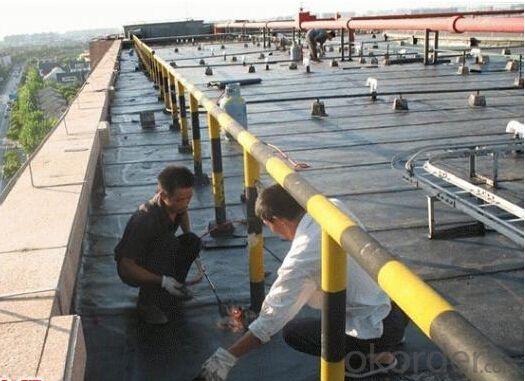
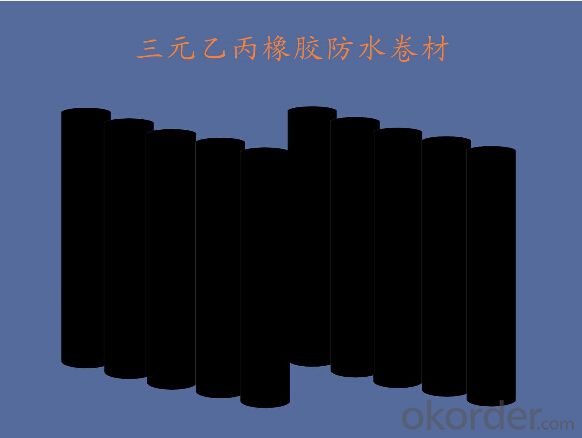
- Q: PVC waterproof membrane effect how
- 4, hot-melt method: the use of flame heater melting hot-melt waterproofing membrane at the bottom of the hot melt adhesive bonding method of construction.
- Q: Can a waterproofing membrane be used on roofs with rooftop gardens?
- Yes, a waterproofing membrane can be used on roofs with rooftop gardens. In fact, it is highly recommended to use a waterproofing membrane to protect the underlying structure from water damage. A rooftop garden adds additional weight and moisture to the roof, so a proper waterproofing system is essential to prevent leaks and ensure the longevity of the roof. The waterproofing membrane acts as a barrier against water infiltration and helps to keep the rooftop garden and the building below dry.
- Q: Are there any specific requirements for installing a waterproofing membrane?
- Yes, there are specific requirements for installing a waterproofing membrane. Some key requirements include ensuring a clean and dry surface, proper preparation of the substrate, correct application of the membrane according to manufacturer's instructions, and adequate curing time. Additionally, ensuring proper seam and joint treatments, as well as sufficient overlap and termination details, are essential for an effective waterproofing installation. It is crucial to follow the specific guidelines and recommendations provided by the manufacturer to ensure a successful and long-lasting waterproofing system.
- Q: Can a waterproofing membrane be used on planter boxes?
- Planter boxes can indeed benefit from the use of a waterproofing membrane. Typically employed to prevent water from seeping through surfaces, a waterproofing membrane safeguards the wood or other materials of the planter box from moisture damage. When applied to the interior, this membrane acts as a barrier, stopping water from infiltrating the material and potentially causing decay or rot. Consequently, the planter box's lifespan is prolonged, ensuring it remains in excellent condition for an extended period. Moreover, the waterproofing membrane aids in retaining moisture within the planter box, which proves advantageous for the growth of plants or flowers. Overall, the application of a waterproofing membrane enhances protection and durability for planter boxes.
- Q: Can a waterproofing membrane be used on adobe block surfaces?
- Yes, a waterproofing membrane can be used on adobe block surfaces. Waterproofing membranes are commonly used to provide an additional barrier against water penetration and moisture damage, and they can be applied to various surfaces, including adobe blocks, to enhance their water resistance and durability.
- Q: Are waterproofing membranes resistant to acid exposure?
- Yes, waterproofing membranes are generally resistant to acid exposure. They are designed to provide a barrier against water and other corrosive substances, including acids. However, the level of resistance may vary depending on the specific type and quality of the membrane used.
- Q: Can waterproofing membranes be used on elevator pits?
- Yes, waterproofing membranes can be used on elevator pits. Elevator pits are prone to water infiltration due to their location below ground level, making them susceptible to water damage and leaks. Waterproofing membranes provide an effective solution to prevent water penetration and protect elevator pits from moisture-related issues. These membranes are designed to create a watertight barrier, usually made of materials such as rubber, polyurethane, or bitumen. They are applied to the walls and floor of the elevator pit, forming a seamless and durable protective layer. This membrane system helps to keep the pit dry, preventing water damage to the elevator components and ensuring the safe and reliable operation of the elevator.
- Q: Can a waterproofing membrane be used on terraces or patios?
- Yes, a waterproofing membrane can be used on terraces or patios. In fact, it is highly recommended to use a waterproofing membrane in these areas to prevent water damage and leakage. Terraces and patios are exposed to various weather conditions, including rain and snow, which can lead to moisture seeping into the underlying structure. A waterproofing membrane acts as a barrier, preventing water from penetrating the surface and protecting the integrity of the terrace or patio. It helps to extend the lifespan of the structure and prevents costly repairs in the long run. Additionally, using a waterproofing membrane also helps to create a more comfortable and usable space, as it eliminates the risk of water accumulation and potential slip hazards. Overall, investing in a high-quality waterproofing membrane is a wise decision for anyone looking to protect their terrace or patio from water damage.
- Q: Can a waterproofing membrane be used for soundproofing purposes?
- To some extent, a waterproofing membrane can serve the purpose of soundproofing as well. While its primary function is to prevent water from seeping through, it also has the ability to minimize sound transmission. Typically, waterproofing membranes are constructed using materials that possess excellent acoustic properties, such as rubber or a combination of rubber and asphalt. These materials have the capability to absorb and muffle sound waves, resulting in a reduction in noise that can penetrate walls or floors. However, it's important to note that the soundproofing capabilities of a waterproofing membrane may not be as substantial as those of specialized soundproofing materials like acoustic panels or insulation. Therefore, if soundproofing is the main objective, it is advisable to consider utilizing dedicated soundproofing solutions in conjunction with or instead of a waterproofing membrane.
- Q: Can waterproof sheets be used on steel roof panels?
- The main products are asphalt waterproofing membrane and polymer waterproofing membrane.
Send your message to us
EPDM Rubber Waterproofing Roof Membrane Weldable
- Loading Port:
- Qingdao
- Payment Terms:
- TT OR LC
- Min Order Qty:
- 2000 m²
- Supply Capability:
- 100000 m²/month
OKorder Service Pledge
OKorder Financial Service
Similar products
Hot products
Hot Searches
Related keywords


